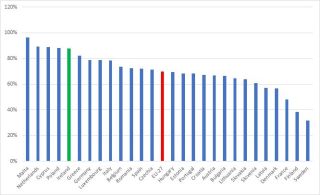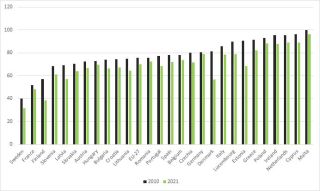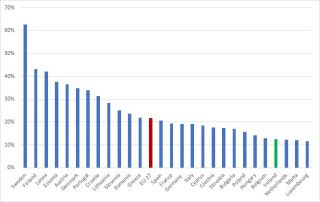Meeting renewable energy targets a huge challenge

Fossil fuels continue to dominate energy use in Ireland and in the European Union. The latest data from Eurostat shows that fossil fuels accounted for 70 per cent of gross energy available in the EU in 2021. Malta had the highest share of fossil fuels in gross available energy at 96 per cent followed by Cyprus and the Netherlands with 89 per cent and Ireland and Poland at 88 per cent. Only three Member States had a rate below 50 per cent. Sweden had the lowest share of fossil fuels in gross available energy at 32 per cent, followed by Finland (38 per cent) and France (50 per cent). This is particularly concerning given the revised targets for renewable energy set out in REPowerEU with renewables as a share of energy by 2030 required to be 45 per cent rather than 40 per cent. Meeting the original target was already challenging, meeting the revised 45 per cent target will require a concerted effort and focus on renewables by all EU member states.
Fossil fuels dominate energy usage
The EU continues to largely rely on fossil fuels for its overall energy supply with very little change between 2020 and 2021. This is particularly concerning given the revised targets for renewable energy set out in REPowerEU with renewables as a share of energy by 2030 required to be 45 per cent rather than 40 per cent. Meeting the original target was already challenging, meeting the revised 45 per cent target will require a concerted effort and focus on renewables by all EU member states.
Chart 1: Share of fossil fuels in gross available energy 2021

Source: Eurostat
Since 2021, all EU member states have recorded a decrease in their share of fossil fuels in gross available energy. Denmark has made the most progress, recording a 25 percentage point reduction, followed by Estonia (a 22 percentage point reduction) and Finland (a 19 percentage point reduction). The smallest decreases are seen in Germany, Romania and Malta and Hungary and France who recorded two three and four percentage point reductions respectively. Ireland recorded an eight percentage point decrease over the period.
Chart 2: Share of fossil fuels in gross available energy 2010 and 2021

Source: Eurostat
Overall share of energy from renewable sources 2021
Looking at the share of energy from renewable sources in 2021, just 22 per cent of energy consumed in the EU came from renewable sources in 2021, this is well below Renewable Energy Directive of 40 per cent and the REPowerEU target of 45 per cent.
Chart 3: Share of energy from renewable sources 2021

Source: Eurostat
Sweden has by far the highest share of energy from renewable sources (62.6 per cent – mainly a mix of biomass, hydro, wind, heat pumps and liquid biofuels). Finland had the second highest share at 43 per cent (mostly biomass and hydro) followed by Latvia at 42 per cent (also mainly biomass and hydro) followed by Estonia (37.6 per cent – mainly biomass and wind), Austria (36.4 per cent mainly hydro and biomass) and Denmark (34.7 per cent – mainly biomass and wind). Of concern, 15 of the 27 EU member state had a share of energy from renewables below the EU average in 2021 (Belgium, Bulgaria, Czechia, Germany, Ireland, Spain, France, Italy, Cyprus, Luxembourg, Hungary, Malta, Netherlands, Poland and Slovakia). The lowest proportions of renewables were recorded in Luxembourg (11.7 per cent, Malta (12.2 per cent), the Netherlands (12.3 per cent), Ireland (12.5 per cent) and Belgium (13.0 per cent). Ireland has a huge amount of work to do to meet the 2030 target. Social Justice Ireland has consistently called for a review of fossil fuel subsidies, for the elimination of those which are harmful to our environment and climate goals and that these resources be invested into renewable energy, upgrading the national grid and supporting a just transition. The value of environmental subsidies in Ireland is substantial (€2.2bn in 2020). Eliminating harmful subsidies and investing in renewable energy and schemes to address energy poverty would put Ireland in a much better place to meet our energy targets.